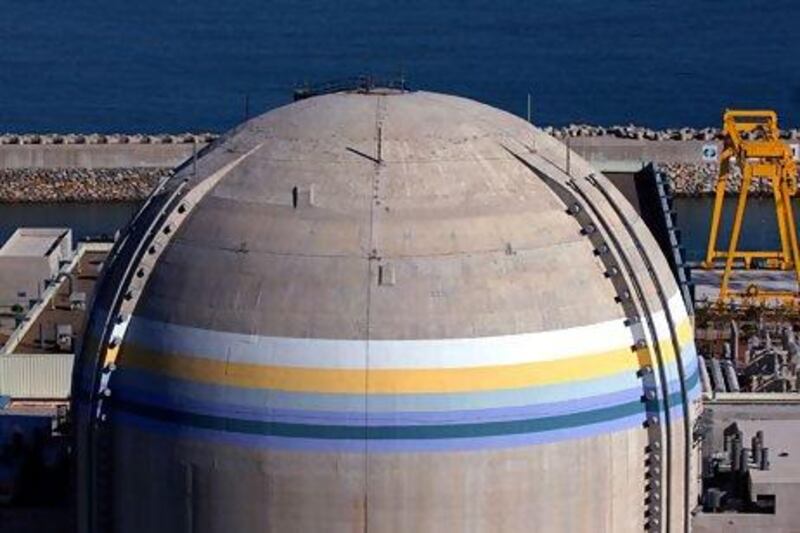Abu Dhabi breaks ground on its second nuclear reactor tomorrow as it moves ahead with the construction of the Arab world's first atomic power plant.
Yoon Sang-jick, the South Korean minister of trade, industry and energy, is set to visit the construction site at Barakah in Al Gharbia tomorrow for a ceremony in which he will be flanked by Emirati officials leading the work on the US$20 billion power plant, which it is hoped will meet up to a quarter of Abu Dhabi's energy needs within the next decade.
"So far this is the most aggressive deployment of a new programme from scratch," said Hamad Al Kaabi, the UAE's permanent representative to the International Atomic Energy Agency and board member of the Federal Authority for Nuclear Regulation.
"Given what happened in the past two years with Fukushima and the attention that the global community paid to nuclear safety, to be able during this time to continue not only on the original plan but also adapt lessons learnt as we go on, this in itself is quite an achievement."
"If you look back five years ago we had these timelines based on a technical evaluation of what's feasible.
"Today after five years to be able to met these timelines after further planning and further work which demonstrates the fastest deployment schedule for nuclear in history really."
The progress on the power plant is being closely watched across the world for a number of firsts.
It is the first, and so far only, nuclear contract South Korea has won overseas, although the country is eager for more nuclear projects.
The UAE is also the first nation to have embarked on nuclear power since the 1986 meltdown at the former Soviet Union's Chernobyl plant.
"This is a development that underscores how serious the UAE is about its nuclear programme," said Mark Hibbs, a senior associate for the nuclear policy programme at the Carnegie Endowment for International Peace.
"It's also an expression of continued confidence that it can deploy the technology on schedule and that it's moving ahead on a project that is complex and requires a lot of inputs from a lot of different places."
"The management and the country's leadership wants to set an example in the world in how a country with relatively few technical resources in this area is going to be deploying the technology."
Mr Yoon is the recently named head of a newly organised ministry that combines South Korea's ministry of knowledge economy with the energy portfolio of the ministry of foreign affairs and trade. Korea Electric Power Corporation, the state nuclear company, is the primary contractor for the four reactors scheduled to come online in Abu Dhabi between 2017 and 2020.
The first reactor, scheduled for completion in 2017 and which began construction last July, is taking shape as a massive crane lowers 3-metre steel rings in a stack to form the main dome of the reactor. The second reactor is at an earlier stage and ready for the pouring of the first safety-related concrete, the foundation of the reactor.
Earlier this year Emirates Nuclear Energy Corporation filed a 10,000-page construction licence application for the third and fourth reactors. It was 1,000 pages longer than the application to build the first two reactors that was approved in July.
Two other milestones remain. The first is Executive Council approval for the plant's financing, a package of Korean and American export credit, international bank loans and Abu Dhabi state funds.
A more long-term task is crafting a strategy for dealing with radioactive waste over hundreds of thousands of years. Options include building an underground waste repository in the UAE, as is being tested in Sweden, Finland and France; building a shared one for the GCC nations; and sending the waste back to the country that supplied the fuel, a yet-untested practice called fuel leasing.
The UAE's civil nuclear programme will be among the key drivers of economic diversification in Al Gharbia, according to the Western Region Development Council. The region's development will be discussed at the Al Gharbia Development Forum at the Ritz-Carlton Abu Dhabi today.
Al Gharbia, which constitutes 60 per cent of the total area of the emirate of Abu Dhabi and 51 per cent of the land mass of the UAE, includes seven cities: Liwa, Madinat Zayed, Ghayathi, Ruwais, Mirfa, Sila and Delma Island. It contributes 45 per cent of the country's GDP, mainly through the oil and gas sector.





